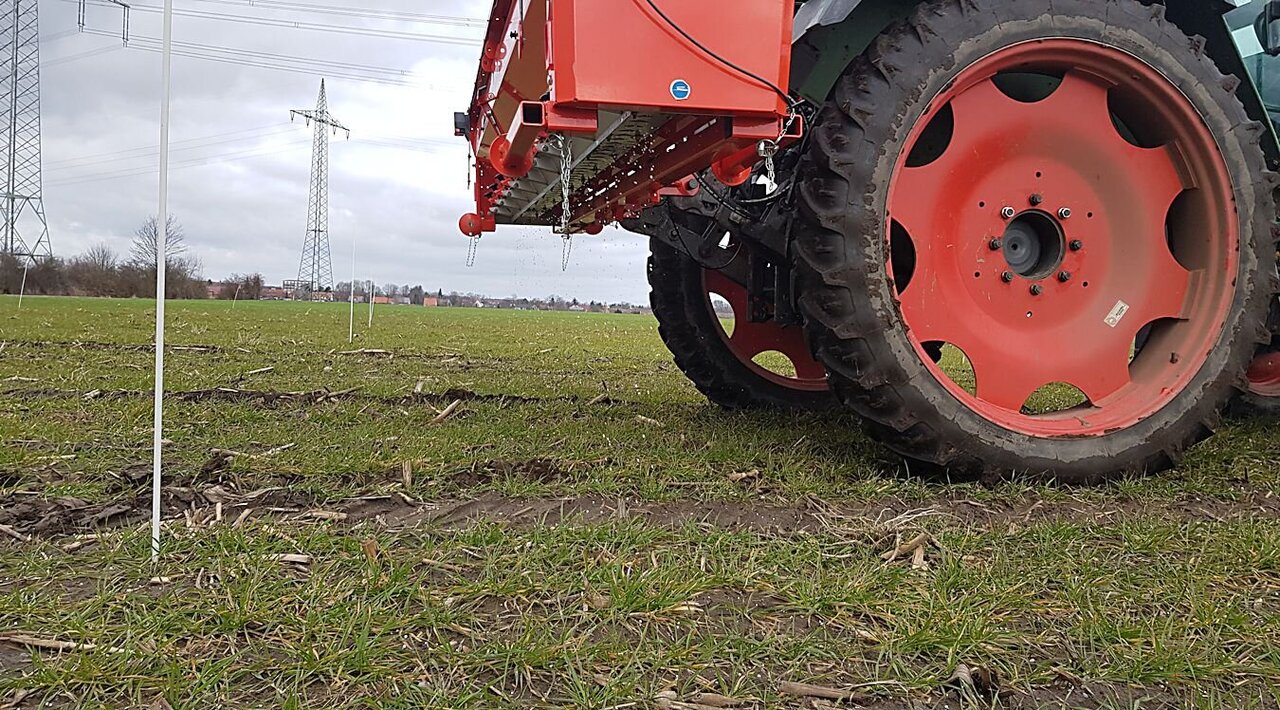Project
Evaluation of nitrification inhibitors as a climate protection measure

Site-differentiated evaluation and crediting of the use of nitrification inhibitors as a climate protection measure in crop production (NitriKlim)
Within the framework of the "Arable Farming Strategy 2035", the Federal Ministry of Food and Agriculture (BMEL) is funding the joint project "Site-differentiated assessment and crediting of the use of nitrification inhibitors as a climate protection measure in plant cultivation (NitriKlim)".
The focus of the NitriKlim R&D project is the site-specific assessment of the environmental and yield benefits of using nitrification inhibitors in nitrogen fertilisation.
Background and Objective
Nitrification inhibitors are proposed as a robust and scalable GHG reduction measure for crop production. However, whether this is an efficient, practical and environmentally sound measure to reduce fertiliser-induced N2O emissions under conditions of Central Europe is controversially discussed by science, policy and practice. On the one hand, there is the potential to significantly reduce both direct and indirect N2O emissions by inhibiting nitrate formation and thus improve the efficiency of nitrogen fertilisation. On the other hand, scientifically robust and site-differentiated results are lacking that reliably assess NI effects taking several points in consideration: i) the site-differentiated annual N2O emissions and nitrate leaching, ii) the ecological long-term efficacy of the inhibitors and their influence on other environmentally and climate-impacting emissions (e.g. ammonia emissions), and (iii) the overall evaluation as a climate protection measure, taking into account climate protection effects, ecological risks, and economic and crop production effects.
The aim of the interdisciplinary joint project is the site-differentiated evaluation of the use of nitrification inhibitors in combination with nitrogen fertilisers as a climate protection measure.
Target Group
- Politics
- Administration
- Science
- Consulting
- Agricultural practice
Approach
The collaborative project comprises both a Germany-wide network of seven coordinated field sites and laboratory experiments at four research institutes, analysing the effects of nitrification inhibitors on soil nitrogen dynamics, direct N2O emission, nitrate leaching as well as nitrogen efficiency and yield level and quality. Furthermore, integrated studies on effects of nitrification inhibitors on the soil microbiome involved in the biogeochemical transformation of soil nitrogen (target and non-target organisms), translocation of inhibitors, interaction with other environmental and climate-impacting emissions (ammonia, methane) as well as the economic assessment of nitrification inhibitors as a climate protection measure are included. Additional focal points are the modelling and regionalisation of the effects of nitrification inhibitors, the quantification of their possible climate protection effects in Germany's greenhouse gas emissions inventory, their comprehensive assessment as a potential climate protection measure and the transfer of knowledge into practice.
Data and Methods
- annual and three-year randomised field trials
- annual N2O field measurements with static bonnets, NH3 measurement on slurry plots
- yield measurement
- Modelling of N2O emissions, nitrate leaching and yield formation
- laboratory incubation experiments with standard protocols
- Analysis of soil microbiome
- Active substance discharge in laboratory column experiments
Links and Downloads
Thünen-Contact

Involved Thünen-Partners
- Flessa, HeinzAK Institute of Climate-Smart Agriculture
- Fuß, RolandAK Institute of Climate-Smart Agriculture
- Groven, Anne-CatherineBD Institute of Biodiversity
- Schulte auf´m Erley, GundaAK Institute of Climate-Smart Agriculture
- Tebbe, ChristophBD Institute of Biodiversity
- Wonneberger, ArnoldAK Institute of Climate-Smart Agriculture
Involved external Thünen-Partners
- Christian-Albrechts-Universität zu Kiel
(Kiel, Deutschland) - Georg-August-Universität Göttingen
(Göttingen, Deutschland) - Hochschule Osnabrück
(Osnabrück, Deutschland) -
Universität Hohenheim
(Hohenheim, Deutschland) - Universität Kassel
(Kassel, Witzenhausen, Deutschland) -
Martin-Luther-Universität Halle-Wittenberg
(Halle (Saale), Deutschland) - Julius Kühn-Institut - Bundesforschungsinstitut für Kulturpflanzen (JKI)
(Quedlinburg, Braunschweig, Groß Lüsewitz, Kleinmachnow, Deutschland)
Funding Body
-
Federal Office for Agriculture and Food (BLE)
(national, öffentlich)
Duration
10.2022 - 9.2026
More Information
Project funding number: 2822ABS015
Project status:
ongoing
Publications
- 0
Pedersen J, Hafner SD, Pacholski AS (2026) Methodological factors affecting ammonia emission measurement with flux chambers from field-applied biogas digestate slurry (Technical note). Atmos Environ X 29:100408, DOI:10.1016/j.aeaoa.2025.100408
- 1
Biewald A, Dippon-Deißler U, Klitzke S, Noll L, Pacholski AS (2025) Urease and nitrification inhibitors for climate and environmental protection : opportunity or risk? Dessau-Roßlau: Umweltbundesamt, 59 p, Texte UBA 77/2025, DOI:10.60810/openumwelt-7919
- 2
Hutchings NJ, Petersen SO, Richards KG, Pacholski AS, Fuß R, Abalos D, Forrestal PJ, Pelster D, Eckard RJ, Alfaro M, Smith KE, Thorman R, Butterbach-Bahl K, Chirinda N, Bittmann S, Klein CAM de, Amon B, van der Weerden TJ, Prado A del, Krol DJ (2024) Preconditions for including the effects of urease and nitrification inhibitors in emission inventories. Global Change Biol 30(12):e17618, DOI:10.1111/gcb.17618
- 3
Herrmann A, Verma S, Techow A, Kluß C, Dittert K, Quakernack R, Pacholski AS, Kage H, Taube F (2023) Assessing nitrous oxide emissions and productivity of cropping systems for biogas production using digestate and mineral fertilisation in a coastal marsh site. Front Environ Sci 11:1231767, DOI:10.3389/fenvs.2023.1231767
- 4
Ni K, Vietinghoff M, Pacholski AS (2023) Targeting yield and reducing nitrous oxide emission by use of single and double inhibitor treated urea during winter wheat season in Northern Germany. Agric Ecosyst Environ 347:108391, DOI:10.1016/j.agee.2023.108391






